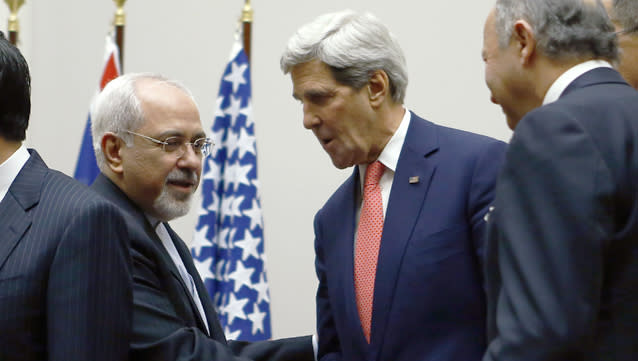Don’t Expect a Big Payoff from the Western Pact with Iran

From the moment Western diplomats struck a deal over the weekend meant to halt Iran’s progress toward attaining nuclear weapons, the White House has emphasized that the easing of sanctions against Tehran is modest, highly conditional and possibly temporary. That pretty well describes the pact’s likely impact on world oil prices and financial markets as well.
Brent crude oil, the variety most closely tied to potential increased Iranian oil exports, slipped 2% in a reflex response to the agreement, to a bit over $108 a barrel. U.S.-centric West Texas Intermediate crude was dragged 1.4% lower, to beneath $94 a barrel. The dollar rallied and stock indexes around the world caught a bid, led overnight by Japan and Korea, which are particularly reliant on imported oil and gas.
Related: Oil Will Bottom at $90: Now's Not the Time to Short Crude, Dicker Says
Yet, for at least three reasons, investors shouldn’t expect the deal to pay ongoing dividends in the form of cheaper energy or big new business opportunities for Western companies in Iran:
--The incremental Iranian crude supply slated to be allowed onto the world market is vanishingly slight – an estimated 200,000 barrels a day, mostly through loosening of some restrictions on chemical-related production in Asia. The lasting impact on prices is likely to be minor. World oil demand is around 90 million barrels per day.
--As I discuss in the attached video with Yahoo Finance’s Lauren Lyster, this situation differs starkly from the standoff over Syria’s alleged use of chemical weapons earlier this year, which brought a specific and potentially imminent threat of military action. The tussle over Iran’s nuclear program has been a simmering conflict for well more than a decade, but the markets never priced in much risk of imminent hostilities.
Related: Al Gore: "Carbon Bubble" is Going to Burst -- Avoid Oil Stocks
In fact, oil prices have been softening for a couple of months on tepid world demand, rising U.S. production and the easing of Syria-related tensions. In fact, trader sentiment toward crude-oil futures recently neared bearish extremes, which is often a setup for the bounce in prices rather than further weakness.
--Energy strategists at Barclays Capital suggest “a downward drift prices in reaction to this interim deal announcement may be short lived. Events on the horizon have the potential to lift prices swiftly again. Most notably, heading into the OPEC meeting [on Dec. 4] with Brent prices at a lower level than the previous meeting, the discussions and official statements are likely reflect a cautious view of the state of market balances and raise the possibility of managing the group’s production quota.”
--This deal is provisional, to be revisited in six months and revocable for noncompliance at any time. And the easing of trade restrictions is quite limited.
Together, these factors make it impractical for big Western companies to attempt to expand trade or find other ways to exploit the largely closed Iranian market, aside from some French automakers with relationships to the Iranian car market.
Related: Oil Prices Have Been Falling but Fracking Will Limit the Decline, Says Dan Yergin
The agreement also introduces a couple of unpredictable political dynamics that could alter the outlook for commodity and financial markets, too. Israeli leaders have been vocally critical of the Iran agreement, with Prime Minister Benjamin Netanyahu calling it an “historic mistake” and saying Israel would not consider itself bound by the deal.
Israel's longstanding resolve to take military action to thwart Iran’s nuclear ambitions remain in place, and reports over the weekend suggest Saudi Arabia would tacitly approve.
Domestically, Republican leaders were sharply critical of the deal and some vowed to introduce measures for new Iran sanctions. Whether this leads to complicating legislation or not, it would seem to raise the prospect that Congress will get even further distracted away from fiscal negotiations ahead of the expiration of the stopgap budget deal that expires next month.
Tell Us What You Think!
And don't forget to follow us on Twitter and Facebook!
More from The Daily Ticker
Want to Cut Government Waste? Find the $8.5 Trillion the Pentagon Can't Account For
Why Companies Should Put Employee Happiness First
Black Friday Ain't What It Used to Be: 2013 a "Transitional Year" for Retailers and Shoppers
Tesla Is on Fire! Consumers Give Model S Highest Rating in Years